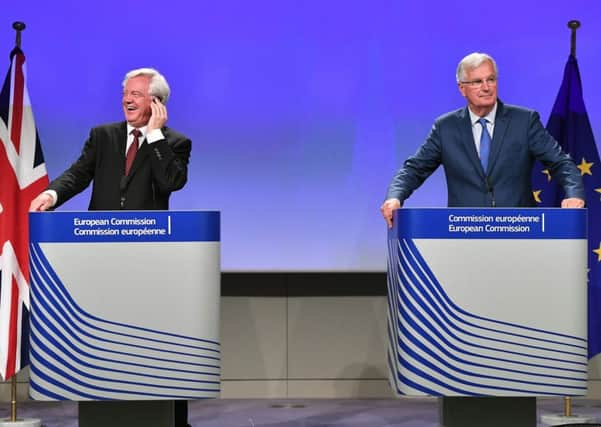UK approach to Brexit is '˜impossible', EU negotiator warns


In a tetchy joint press conference with Brexit Secretary David Davis at the end of the third round of talks, Mr Barnier warned that the pace of talks was too slow to break the deadlock on key issues including the UK’s so-called “divorce bill” by an October deadline.
The two men offered very different reflections on the week’s talks, with Mr Barnier saying there had been “no progress” on the central issues affecting the UK’s withdrawal deal, while Mr Davis said there had been “concrete progress”.
Advertisement
Hide AdAdvertisement
Hide AdCiting a lack of trust as a stumbling block, Mr Barnier said: “The UK wants to take back control, wants to adopt its own standards and regulations – but it also wants to have these standards recognised automatically in the EU.
“That is what UK papers ask for. This is simply impossible. You cannot be outside the single market and shape its legal order.”
Mr Davis appeared to be stung by his EU counterpart’s claim that there was “nostalgia” in the UK’s proposals to keep many benefits of single market membership.
The Brexit Secretary shot back: “I wouldn’t call belief in free trade nostalgia.”
It was revealed that the UK legal position on a Brexit financial settlement, set out in talks for the first time this week, is that the government is not obliged to pay for anything not covered by the single-year EU budget up until the point of departure in March 2019. However, Mr Davis acknowledged the UK had a “moral” duty to contribute further funds.
A senior EU official said that not only were the two sides far apart on that legal interpretation, but that payments for any access to the single market during a post-Brexit transition phase would have to be added to the divorce bill.
Talks appear to be deadlocked on the issue of the financial settlement, which could reach as much as £80 billion. The EU wants to make “sufficient progress” on the Brexit bill, citizens’ rights and the status of the Irish border before opening talks on a future trading relationship with the UK.
The EU source criticised calls by Mr Davis for trade talks to start now, saying the sensitive issue of Northern Ireland should not be allowed to fall “hostage” to economic concerns.
Advertisement
Hide AdAdvertisement
Hide AdAnd Mr Barnier also responded to British calls for EU member states to issue new negotiating guidelines so trade talks can take place, warning that anyone trying to drive a wedge between the European Commission-led negotiating team and the 27 member governments was “wasting their time”.
However, there was good news for British citizens living and working in the EU despite the deadlock in Brussels.
Negotiators confirmed that people covered by the UK’s withdrawal agreement – EU nationals living in Britain and British citizens living in the EU when Brexit takes place – will have public healthcare access and social security rights protected, though only in the country where they are resident.
Qualifications gained before the UK’s exit date will also continue to be recognised on the same basis across the EU, and British citizens working in Europe in a range of professions will keep their right to own a business.
However, access to the European Health Insurance Card (Ehic), which entitles EU citizens to public healthcare while travelling around Europe, will only be available to UK nationals living in the EU. The EU’s insistence that the Ehic is withdrawn from UK residents is a leading example of what British officials claim is inflexibility on the European side.
